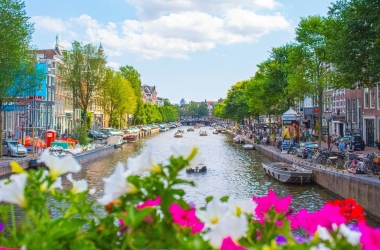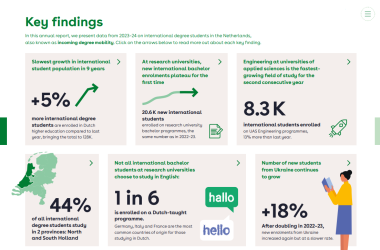Netherlands Sees Slowest Growth in International Student Numbers in Almost a Decade

Peter Birdsall Says Decline in International Student Growth Not Surprising
The Netherlands is seeing its slowest growth in international student numbers in nearly a decade, according to a recent report from Nuffic.
This academic year (2023/24) showed a significant slowdown, with international student enrolment rising by just 5.4%, the smallest increase since 2014.
Reflecting on this trend, Saoradh Favier from Nuffic told The PIE News that while they are still seeing growth, it is very different from the double-digit growth rates they saw in previous years.
Favier also highlighted a significant shift, stating, “In university undergraduate courses, it is the first time we have seen no increase in the number of new international students.”
Peter Birdsall, President of Wittenborg, emphasised the impact of market perceptions, stating, “The decline is not surprising at all – none of the regulations changing English language programmes to be taught in Dutch have actually happened yet – but this is a gut reaction by the market based on the perception of studying in the Netherlands.”
The publication reports that the rapid internationalisation of higher education over the past decade has raised government concerns about Dutch students' access to universities. There are also worries about the overuse of English in higher education. In response, leading Dutch institutions have recently moved to reduce the number of English-taught degrees and international student enrolments.
Ruben Puylaert, spokesperson for Universities of the Netherlands, emphasised the delicate balance between internationalisation and domestic educational priorities.
Puylaert stated, “Internationalisation is of great importance to the Netherlands … At the same time, large numbers of international students can put pressure on the accessibility and quality of education, and there is insufficient student accommodation in some cities.”

Shifts in International Student Demographics
Despite the overall slowdown, certain demographic shifts are evident. The report highlighted a significant increase in Chinese student numbers, attributed to the lifting of restrictions following the pandemic. However, Birdsall disagreed about the impact of lifting Covid restrictions, instead pointing to the actions of agents and pathway providers, enrolling as many students as possible before restrictions come into force in the Netherlands.
The geographical distribution of international students within the Netherlands also reveals disparities. While western provinces like South and North Holland host a significant portion of international students, regions like Zeeland, Drenthe, and Flevoland have much lower numbers.
Looking ahead, the political landscape in the Netherlands is poised to impact international student flows. The formation of a new government, led by former intelligence chief Dick Schoof, signals potential policy changes. Plans for enrolment limits, tuition fee hikes and funding cuts could reshape the higher education landscape.
Birdsall anticipates significant challenges ahead, particularly regarding postgraduate work routes. He emphasised the importance of international partnerships to navigate these changes.
Birdsall further states that Wittenborg has been working hard to maintain international student recruitment and, so far, has not been significantly impacted by declining growth.
However, he expects the “stringent anti-immigration policy” of the future government to have a considerable effect on international student flows and is already exploring TNE partnerships in China, India, the Emirates and Ghana.
“What will raise its head in the Netherlands is postgraduate work routes, which are embedded in European law so will be a harder fight to change than in the UK, but that would really disturb the market and particularly so for us as a business school,” he added. “The implications for higher education in the Netherlands as a whole are quite dramatic … it’s not just internationalisation, it really is a backlash against liberal, educated people.”
WUP 31/05/2024
by Erene Roux
©WUAS Press